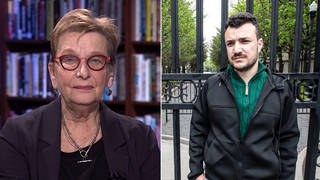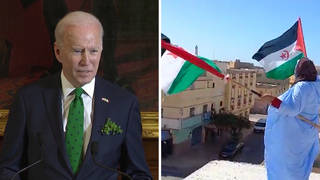
Guests
- Stephen Zunesprofessor of politics and international studies at the University of San Francisco.
President Donald Trump broke with decades of U.S. foreign policy in the waning days of his administration and recognized Moroccan sovereignty over Western Sahara, a territory the country has occupied since 1975 in defiance of the United Nations and the international community. U.S. recognition came as Morocco agreed to establish diplomatic relations with Israel, becoming the fourth Arab nation to do so in recent months as part of a regional push by the Trump administration to strengthen Israel without addressing the Palestinian conflict. Now the Biden administration must weigh whether to reverse Trump’s decision on Western Sahara. “It’ll be very dangerous if Biden does not reverse Trump’s unprecedented recognition of Morocco’s takeover of Western Sahara,” says Stephen Zunes, professor of politics and international studies at the University of San Francisco. “The United Nations Charter is very clear that the expansion of territory by military force is illegitimate.”
Transcript
AMY GOODMAN: We end today’s show looking at another foreign policy issue facing the Biden administration. In December, the United States became the first country in the world to recognize Morocco’s sovereignty over occupied Western Sahara — what many consider to be Africa’s last colony. Morocco has occupied much of the resource-rich territory since 1975 in defiance of the United Nations and the international community. President Trump made the announcement as Morocco agreed to establish diplomatic relations with Israel, becoming the fourth Arab nation to do so in recent months as part of what’s known as the Abraham Accords.
During Secretary of State Tony Blinken’s first news conference last week at the State Department, the AFP reporter who’s head of the State Department Correspondents’ Association, Shaun Tandon, asked Blinken about the Abraham Accords and Western Sahara.
SHAUN TANDON: And with Morocco, does the United States still recognize, as the previous administration said, Moroccan sovereignty in Western Sahara? Thank you.
SECRETARY OF STATE ANTONY BLINKEN: Thank you. Thanks very much. A couple of things on that. First, as we’ve said, we very much support the Abraham Accords. We think that Israel normalizing relations with its neighbors and other countries in the region is a very positive development. And so we applaud them, and we hope that there may be an opportunity to build on them in the months and years ahead. We’re also trying to make sure that we have a full understanding of any commitments that may have been made in securing those agreements. And that’s something we’re looking at right now.
AMY GOODMAN: That’s Secretary of State Tony Blinken.
We’re joined now by Stephen Zunes, professor of politics and international studies at the University of San Francisco, co-author of Western Sahara: War, Nationalism, and Conflict Irresolution. His recent article published in Truthout headlined “One of the Democrats’ Biggest Hawks Is Now Senate Foreign Relations Chair.”
So, it’s clear the Biden administration has not yet made up their mind about whether to draw back from what Trump did, this unprecedented move of recognizing Morocco’s sovereignty over Western Sahara in exchange for Morocco recognizing Israel. Now Morocco says they’re not going to move ahead on Israel, unless they know that the Biden administration will continue Trump’s move. Talk about the significance of all of this, Professor Zunes.
STEPHEN ZUNES: It will be very dangerous if Biden does not reverse Trump’s unprecedented recognition of Morocco’s takeover of Western Sahara. I mean, the United Nations Charter is very clear that the expansion of territory by military force is illegitimate. And Trump already made the dangerous precedent in terms of recognizing Israel’s annexation of the Golan Heights of Syria. However, the taking over an entire country brings it to a new level, especially since Western Sahara is recognized by the African Union as a full member state. Over 80 countries have recognized the independent Sahrawi Arab Democratic Republic. So, essentially, what Trump was doing was to endorse the takeover of one recognized African country by another. And failure to reverse this would signal that the Biden administration shares the Trump administration’s contempt for fundamental international law.
There’s been a lot of pressure on Biden from both directions. In the Senate, you have everybody from a leading liberal like Senator Patrick Leahy of Vermont to a very right-wing Senator Jim Inhofe of Oklahoma saying this is dangerous, it needs to be reversed. At the same time, because Trump tied it with Israel, he has been getting a fair amount of pressure to say, “Hey, you say you support the Abraham Accords. You say you support Morocco’s recognition of Israel. You’re putting this in jeopardy if you reverse this kind of recognition.”
So, we’re at a very critical point right now. And the fact that he hasn’t made an announcement yet seems to indicate that it could go either direction.
AMY GOODMAN: It’s interesting that though he’s spoken to a number of world leaders, from Japan to Mexico to Canada to Russia, he has not spoken to the Israeli Prime Minister Netanyahu yet.
STEPHEN ZUNES: Well, it was pretty clear that Netanyahu favored Trump and that the Israeli government has been pursuing policies that the Biden administration has not supported. At the same time, Biden has reiterated that the United States will continue to send billions of dollars of unconditional, taxpayer-funded military aid to Israel regardless of their violations of international legal norms. So I think it’s one of these contradictory policies. They’re doing a little finger wagging of Israel about certain things, but knowing that the U.S. is really not going to do anything about it, about their policies.
But in terms of the lack of a phone call, I think it does indicate that relations will be somewhat frostier in certain respects. But again, I think that this idea that it’s a great triumph for these authoritarian Arab states to recognize Israel in exchange for things like massive arms sales or supporting the recognition, it’s not really a step towards peace, especially since, of course, the fundamental problem, the reason there isn’t peace, is not because of nonrecognition per se, but the fact that the Palestinians are still under occupation and have not been allowed an act of self-determination, just as the people of Western Sahara have not been allowed an act of self-determination.
AMY GOODMAN: Professor Zunes, in the last minute we have, you have written about the new Secretary of State Tony Blinken’s record. Can you share a moment of it with us?
STEPHEN ZUNES: Unfortunately, like Biden, he is very much of a hawk. He was a passionate supporter of the invasion of Iraq. And like Biden, who chaired the Senate Foreign Relations Committee when Blinken was the chief staffer, he only allowed a day and a half worth of hearings on this, the most important foreign policy issue of the past quarter-century, and stacked the witness list with war supporters. Blinken was also a big supporter of U.S. intervention in Syria and in Libya. And he’s been a big supporter of the Israeli government in its policies.
And so, unfortunately, we’ll not — sometimes the State Department has been a moderating force to more hawkish presidents, as has the head of the Senate Foreign Relations Committee. Both Menendez, in foreign relations, and Blinken, secretary of state, are, if anything, to the right of Biden. So I think that leaves us, in the grassroots, to challenge the administration policy to make sure it doesn’t get us into trouble in terms of impetuous, interventionist policies and supporting dictatorships and occupying armies.
AMY GOODMAN: Stephen Zunes, we want to thank you for being with us, professor of politics and international studies at the University of San Francisco, co-author of Western Sahara: War, Nationalism, and Conflict Irresolution.
To see our documentary on Western Sahara, go to democracynow.org.
That does it for our broadcast. Democracy Now! produced with Mike Burke, Renée Feltz, Deena Guzder, Libby Rainey, Nermeen Shaikh, María Taracena, Carla Wills, Tami Woronoff, Charina Nadura, Sam Alcoff, Tey-Marie Astudillo, John Hamilton, Robby Karran, Hany Massoud, Adriano Contreras. Special thanks to Julie Crosby. I’m Amy Goodman.












Media Options